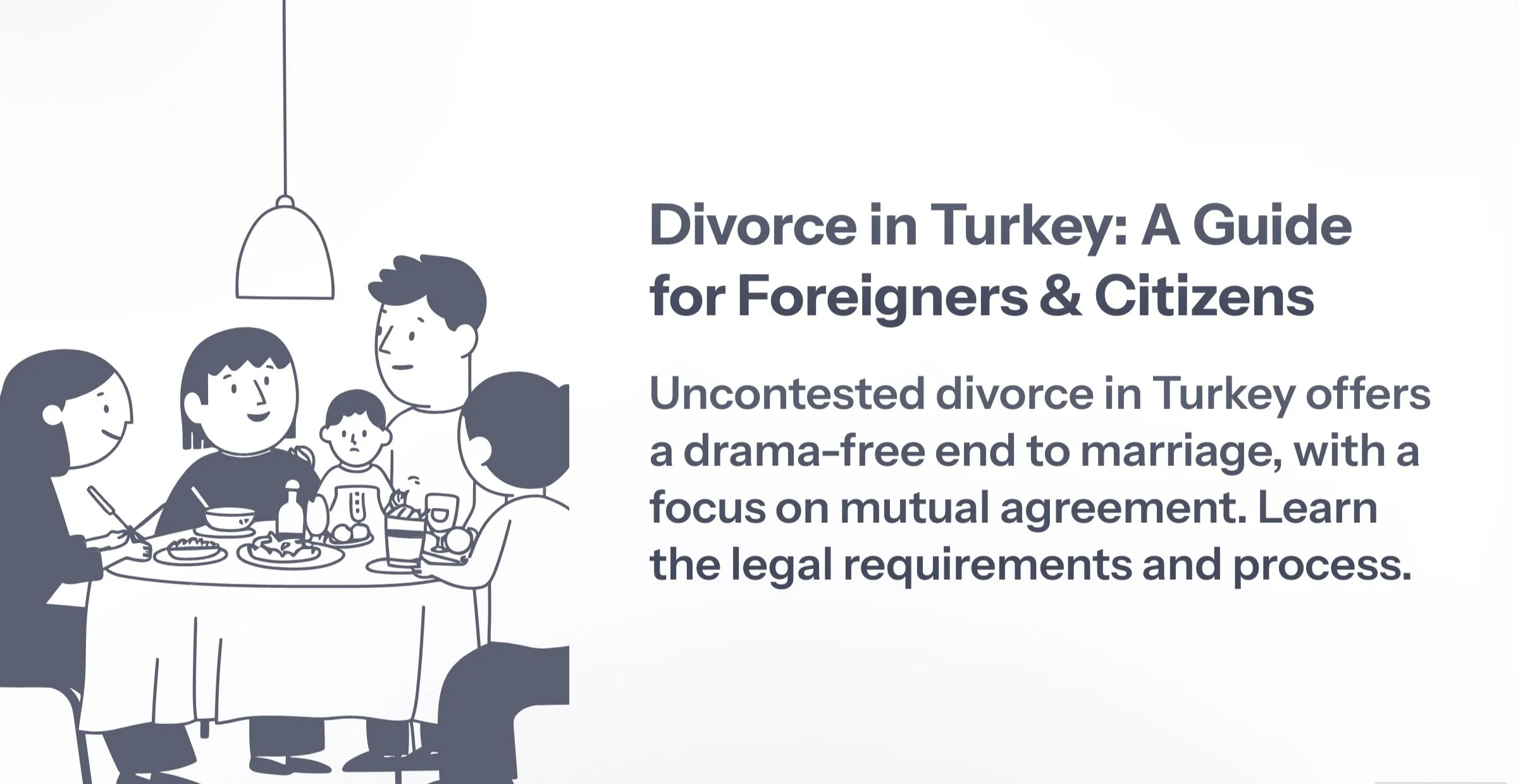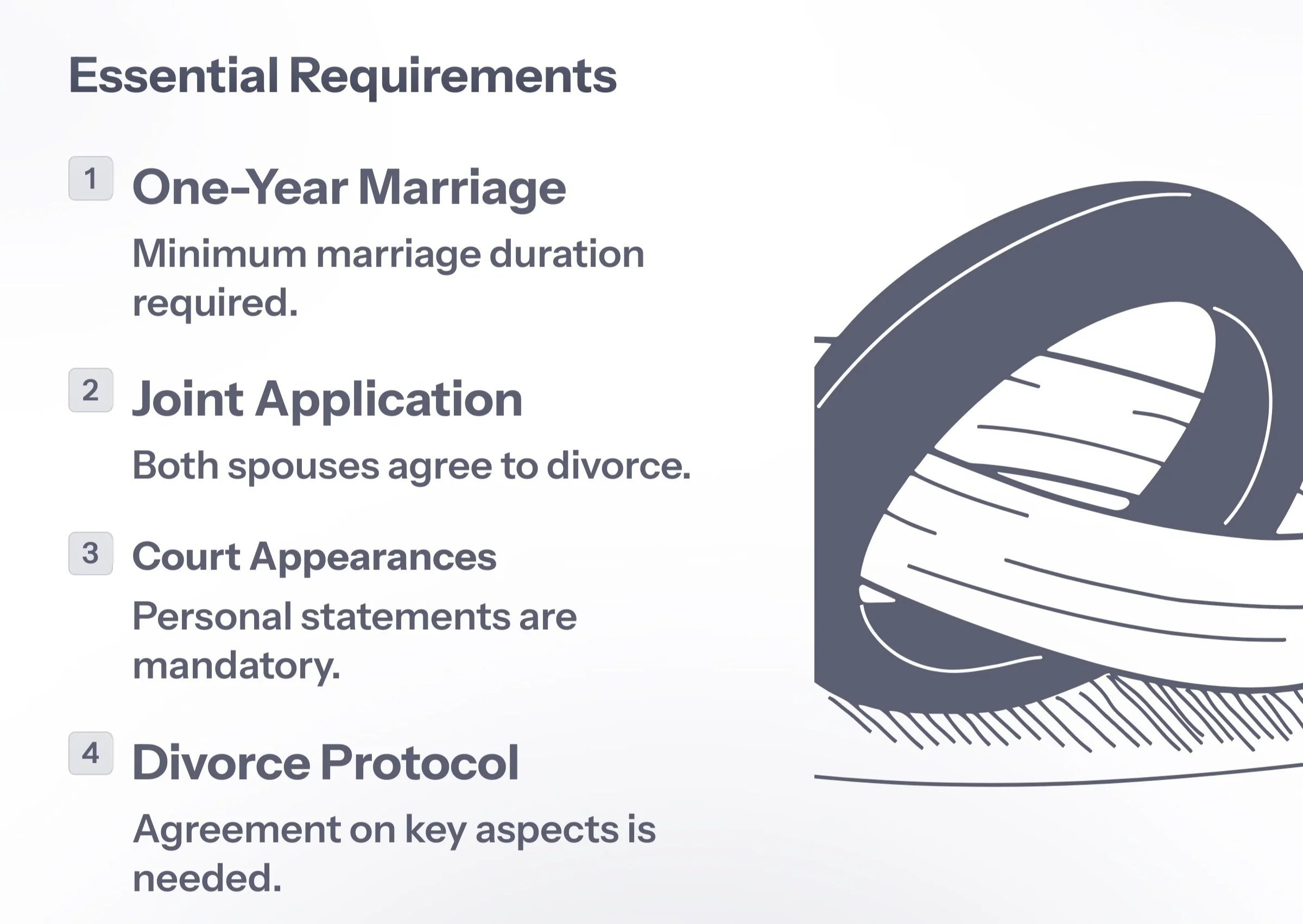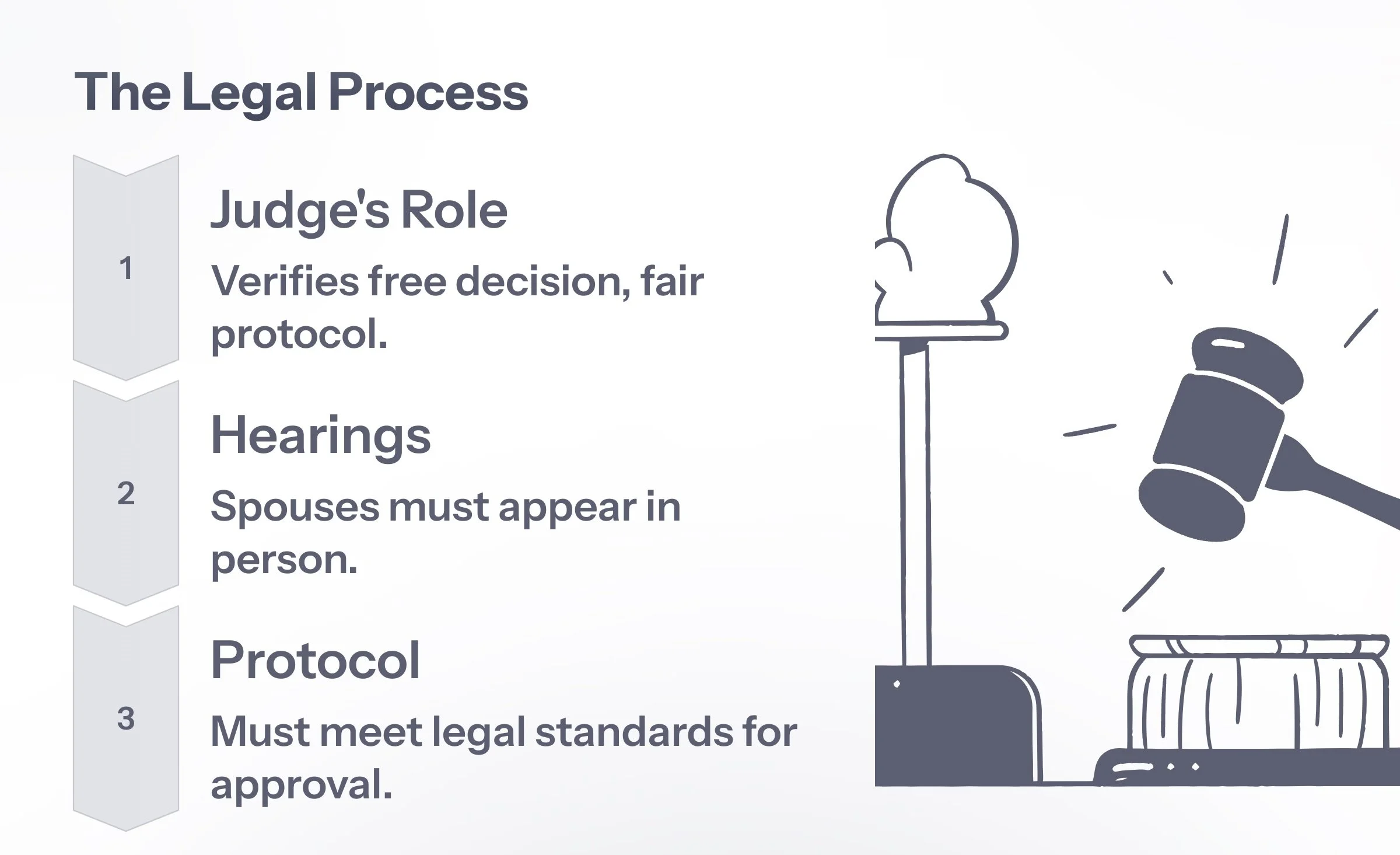Divorce in Turkey: Legal Requirements and Process for Uncontested Divorce
Getting a divorce in Turkey wasn't always easy. Before 1988, even couples who wanted to split amicably still had to fight it out in court, with one spouse taking the blame. Today, uncontested divorce, also known as mutual divorce, offers a different story - you can end your marriage without the drama, as long as you've been married for one year and both agree on the terms.
As Turkish family lawyers, we've seen how this shift has helped countless couples, especially foreigners living in Turkey. While most legal websites focus on basic requirements, we'll take you behind the scenes of Turkish uncontested divorce - from the judge's actual role in the process to the specific details your divorce protocol needs to include. Because knowing what happens in that courtroom matters more than any checklist you'll find online.
The Evolution of Uncontested Divorce Law in Turkey
Pre-Republic Islamic Law to Modern Turkish Civil Code
Before the Turkish Republic, divorce was governed by Islamic Law, where "talak" gave men unilateral divorce rights without requiring official approval. Women could obtain divorce through "hul" by paying compensation to their husbands. The first significant modernization came with the 1917 Family Law Decree, which gave women limited divorce rights. The real transformation occurred in 1926 when Turkey adopted its first Civil Code, based on Swiss law. However, this initial modernization didn't include provisions for mutual, uncontested divorce, as lawmakers worried it might weaken family structures. This historical context helps explain why Turkish divorce law evolved gradually and why certain protections remain in place today.
Major Legal Changes Since 1988 in Turkish Divorce Law
The watershed moment for Turkish divorce law came in 1988 when uncontested divorce was finally legalized after multiple failed attempts since 1946. Previous proposals were rejected due to concerns about undermining family values. The 1988 amendment introduced the concept of "mutual consent divorce" with specific requirements, including a mandatory one-year marriage period before filing. The 2002 Turkish Civil Code maintained these provisions but reorganized them under "Fundamental Breakdown of Marriage." This change represented a shift from viewing divorce as a fault-based process to recognizing it as a mutual decision between spouses.
How Turkish Uncontested Divorce Law Compares to European Standard
Turkey's uncontested divorce framework aligns with many European standards while maintaining some unique characteristics. Unlike countries like Denmark and Russia, which allow administrative divorces, Turkey requires court approval for all divorces, similar to Germany and Switzerland. Turkey requires couples to be married for at least one year before filing for uncontested divorce, while other European countries have different types of waiting periods - the Czech Republic and Finland require six-month reflection periods for divorce proceedings, and Ireland requires four months. Some countries like Austria require couples to live separately for at least six months before filing. This comparison shows that Turkish law balances modern European approaches with local social considerations, providing a structured framework that emphasizes judicial oversight while acknowledging mutual consent.
Essential Requirements for Uncontested Divorce in Turkey
The Mandatory One-Year Marriage Rule
The Turkish Civil Code requires couples to be married for at least one year before filing for uncontested divorce. This requirement aims to prevent hasty divorces and give couples time to fully consider their decision. Interestingly, couples don't need to live together during this year - the law only requires the marriage to legally exist for one year. If spouses remarry each other after a divorce, they must wait another full year before filing for uncontested divorce again. This waiting period is considered a procedural requirement, meaning courts must dismiss cases filed before the one-year mark, even if the couple agrees to divorce.
Joint Application Process for Spouses
Couples can file for uncontested divorce in two ways:
Through a joint petition
When one spouse files and the other accepts the divorce
When filing jointly, only one court application fee is required. The application must include both spouses' clear intention to divorce and their agreed-upon terms. Unlike some traditional divorce cases, uncontested divorce applications don't require proof of fault or specific reasons for ending the marriage. This streamlined process makes the experience less confrontational and typically more efficient for both parties.
Required Court Appearances and Personal Statements
One of the most crucial requirements is that both spouses must appear personally before the judge - this cannot be delegated to lawyers or done through written statements alone. The judge must directly hear from both parties to verify that their decision to divorce is voluntary and free from coercion. Even if a spouse is in prison, they must be brought to court or participate via video conference with consent. This personal appearance requirement exists to protect both parties and ensure that neither spouse is being pressured into the divorce against their will.
Planning the Divorce Protocol Agreement
The divorce protocol is a comprehensive document that must address key aspects of the divorce, including financial arrangements and child-related matters. At minimum, the agreement should cover:
Alimony
Child custody
Visitation rights
Any other financial obligations
While property division isn't mandatory in the protocol, including it can prevent future disputes. The judge has the authority to request changes to the protocol if they believe it doesn't adequately protect the interests of either spouse or their children. However, any changes must be accepted by both parties for the divorce to proceed.
Turkish Divorce Procedure in Turkish Courts for Uncontested Divorce
Judge's Role in Uncontested Divorce Cases
Unlike traditional divorce cases, judges in uncontested divorce proceedings don't investigate the reasons for divorce or determine fault. Their primary responsibility is to verify that both spouses are making a free and informed decision. The judge must ensure the divorce protocol is fair and protects the interests of all parties involved, including children. While judges are typically bound by the parties' statements in other cases, uncontested divorce is unique - the judge can modify the agreement if they believe it's necessary to protect either spouse's or the children's interests. However, any changes must be accepted by both parties for the divorce to proceed.
Mandatory Personal Hearings Before the Judge
The personal hearing requirement is a cornerstone of Turkish uncontested divorce proceedings. Both spouses must appear before the judge in person - this cannot be delegated to lawyers or conducted through written statements. The judge must personally evaluate whether both parties are making their decision freely, without pressure or coercion. While some countries allow administrative divorces, Turkish law maintains this judicial oversight as an essential safeguard. For individuals with limited legal capacity, such as minors who are married, the judge must still hear their personal statement, even if their legal guardian is involved.
Protocol Approval Requirements
The divorce protocol must meet specific legal standards, such as those listed above, before a judge can approve it. The agreement should comprehensively address key issues including alimony, child custody, and visitation rights. While property division isn't mandatory in the protocol, including it can prevent future disputes. The judge evaluates whether the protocol is fair and protects both parties' interests. If the judge suggests changes and either spouse doesn't accept them, the uncontested divorce cannot proceed or is shifted to a contested divorce. This requirement ensures that both parties actively participate in creating a fair and workable post-divorce arrangement.
Financial and Child-Related Arrangements
The court places special emphasis on financial and child-related matters in the divorce protocol. While property division can be handled separately, agreements about child support, custody arrangements, and visitation rights must be clearly defined in the protocol. The judge has a duty to ensure these arrangements serve the best interests of any children involved. Financial arrangements must be specific and feasible - vague or unrealistic agreements won't receive court approval. Each party's rights and obligations should be clearly stated to prevent future conflicts and ensure a stable post-divorce environment, particularly for any children involved.
Less Stress with your Turkish Divorce Lawyer
Getting divorced in Turkey might seem daunting, especially for foreigners, but the process is more straightforward than you'd think. Since 1988, Turkish courts have embraced uncontested divorce as a practical solution for couples who agree to part ways. The one-year waiting period and required court appearances - while formal requirements - actually help ensure both parties make informed decisions they won't regret later.
At Atlas Legal Partners, we have English Speaking Lawyers in Turkey, who have guided numerous international clients through uncontested divorce proceedings. Many are surprised to learn they don't need to prove fault or air grievances in court. Instead, they can focus on crafting a fair agreement that works for everyone involved and help you move forward to the next chapter of your lives.
Whether you're contemplating divorce or simply curious about Turkish family law, we'd love to hear your thoughts. Have you noticed how divorce laws in your home country differ from Turkey's approach? Your experiences could help others facing similar situations.




